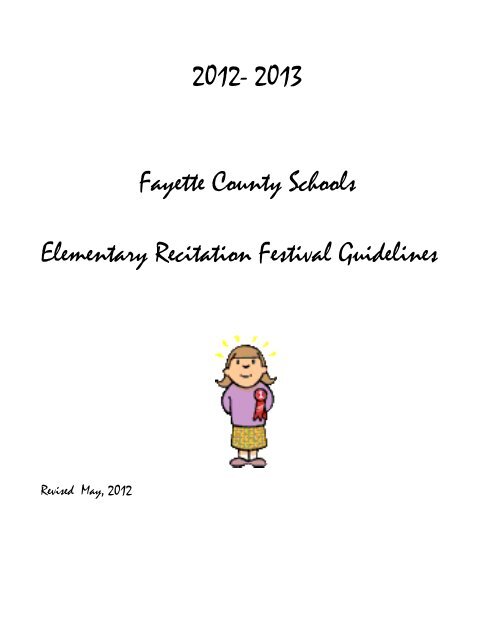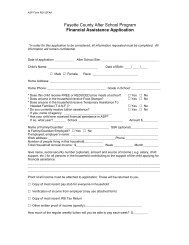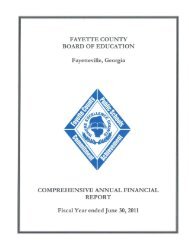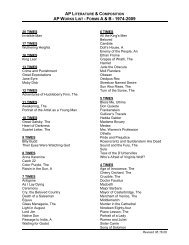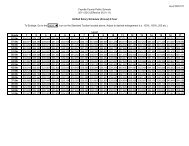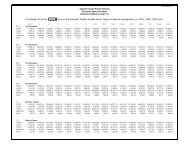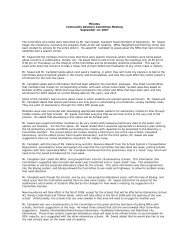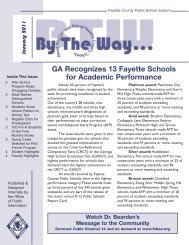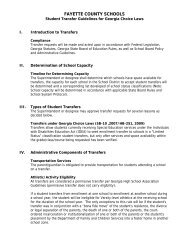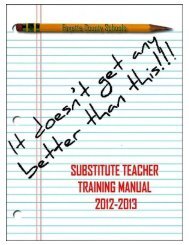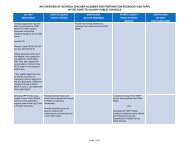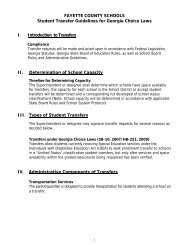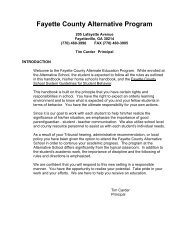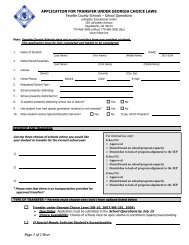2012-13 K-5 Recitation Guidelines - Fayette County Schools
2012-13 K-5 Recitation Guidelines - Fayette County Schools
2012-13 K-5 Recitation Guidelines - Fayette County Schools
You also want an ePaper? Increase the reach of your titles
YUMPU automatically turns print PDFs into web optimized ePapers that Google loves.
<strong>2012</strong>- 20<strong>13</strong><br />
<strong>Fayette</strong> <strong>County</strong> <strong>Schools</strong><br />
Elementary <strong>Recitation</strong> Festival <strong>Guidelines</strong><br />
Revised May, <strong>2012</strong>
<strong>Fayette</strong> <strong>County</strong> Public <strong>Schools</strong><br />
K-5 Poetry <strong>Recitation</strong> Festivals<br />
Event Information<br />
K-5 System Level <strong>Recitation</strong> Festivals – LEC Media Center – Bldg A<br />
o Monday, December 3, <strong>2012</strong> – Kindergarten (3:30pm) - First Grade (4:30pm)<br />
o Tuesday, December 4, <strong>2012</strong> – Second Grade (3:30pm) - Third Grade (4:30pm)<br />
o Wednesday, December 5, <strong>2012</strong> – Fourth Grade (3:30pm)<br />
o Thursday, December 6, <strong>2012</strong> – Fifth Grade (3:30pm)<br />
Grade 6, 7, and 8 <strong>Recitation</strong> Festival – LEC Media Center – Bldg A<br />
o Thursday, December 6, <strong>2012</strong> – Middle School (5:30pm)<br />
RESA Literacy Days Celebrations – www.griffinresa.net<br />
o Tuesday, February 12, 20<strong>13</strong> – K-2<br />
o Wednesday, February <strong>13</strong>, 20<strong>13</strong> – 3-5<br />
o Thursday, February 14, 20<strong>13</strong> – 6-8
Selection of <strong>Recitation</strong> Piece<br />
<strong>Guidelines</strong> for the <strong>Recitation</strong> Festival<br />
Poems selected for presentation must be published poems that possess historical, cultural, or aesthetic<br />
value. Since poems must also be grade level appropriate, students should be assisted in their selection<br />
of a poem for recitation. System level presenters will be asked to produce the text or website from which<br />
the poem was taken. Other considerations include:<br />
Each selection must have been originally published as a poem - not as prose. It cannot be a<br />
speech, introduction to a novel, part of a religious or historical document or excerpt from a drama.<br />
Lyrics from an original musical composition are not eligible.<br />
<strong>Recitation</strong> of a portion of a longer poem is not allowed. No lines or stanzas may be struck from an<br />
original piece. (The poet wrote eight stanzas, so eight stanzas must be recited.)<br />
No words may be changed within, deleted from, or added to an original piece. (The poet chose very<br />
specific words, so those words must be recited. This includes the title of the poem.)<br />
Serious consideration should be given to balancing the difficulty of a piece with the potential for<br />
accuracy and effective interpretation in the selection of any poem. The <strong>Recitation</strong> Judging Scale has<br />
been revised for the <strong>2012</strong>-20<strong>13</strong> <strong>Recitation</strong> Festivals – now scoring the accuracy of a recitation in terms of<br />
the difficulty of the piece. Carefully review the New, Revised <strong>Recitation</strong> Judging Scale for <strong>2012</strong>-20<strong>13</strong> on<br />
page 4 of this packet for an understanding of how the Difficulty of Piece score will now influence the<br />
Memory/Accuracy score.<br />
Presentation<br />
<strong>Schools</strong> must hold classroom and grade level competitions to select their representatives to the system<br />
level recitation festivals. System level presenters must be a product of school level competitions which<br />
offer all students equal opportunity to participate. This process assures that every presenter has had<br />
comparable opportunities to compete prior to system level events. School representatives should<br />
practice performing on a stage without a sound system prior to the system-level contest. There will be<br />
no microphone at the county or RESA level competitions.<br />
This event focuses on the recitation - not a dramatic re-enactment or interpretation – of a piece of poetry.<br />
Props and costumes are not allowed, and gestures should be used with restraint. Use of dialects is not<br />
recommended unless the dialect is integral to the interpretation of the poem and the presenter can<br />
sustain the dialect throughout the poem with accuracy of articulation.
<strong>Recitation</strong> Festival Suggestions<br />
The secret to the effective recitation of a poem is practice. Patience and perseverance will overcome the<br />
difficulty of memorization and presentation. Practice before different audiences to gain confidence and<br />
fluency. Practice without notes as soon as possible. Practice slow delivery and natural movements so<br />
that the audience can take the meaning of the words into their hearts and minds.<br />
Stage Presence<br />
Smile.<br />
Let your eyes range over the entire audience from front to back and side to side.<br />
Speak to the back of the room.<br />
Let your voice naturally lift and drop with the cadence of the text.<br />
Articulation<br />
Quality – Tone of voice reveals your feelings about your poem.<br />
Pitch - Questions and statements require different voice pitch; your voice. gliding up and<br />
down adds color and feeling to the recitation.<br />
Force – Intensity of your voice – let your volume match the mood of the text.<br />
Rate – Vary the rate of recitation with the mood of the text.<br />
Phrasing – Group words into meaningful phrases so that thoughts and images of the poet are<br />
best expressed to the audience.<br />
Interpretation<br />
With practice, the meaning of the selection determines what should be emphasized. Develop<br />
your own techniques of voice and body that convey what the poem means to you – your own<br />
interpretation of what the poet was trying to convey.<br />
Think of your own experiences and use them to communicate what the poem means to you.<br />
Memory/Accuracy<br />
Recite accurately so that the poet’s message is clearly conveyed to the listener.<br />
Practice with a qualified listener; record your recitations to check for accuracy and strengths<br />
and weaknesses.<br />
Style<br />
Your natural style will develop with practice. With the confidence that fluency and accuracy<br />
bring, you will develop your own, unique winning style.
A.<br />
Stage<br />
Presence<br />
B.<br />
Articulation<br />
C.<br />
Interpretation<br />
D.<br />
Difficulty<br />
of Piece (DoP)*<br />
E.<br />
F.<br />
Memory/<br />
Accuracy<br />
Movement<br />
of Feet<br />
New, Revised <strong>Recitation</strong> Judging Scale for <strong>2012</strong>-20<strong>13</strong><br />
(1) No eye contact<br />
(2)<br />
(1)<br />
1 2 3 4 TOTAL<br />
Overly dramatic<br />
body language<br />
or no gestures<br />
Unclear;<br />
Inappropriate<br />
volume<br />
Monotone or<br />
sing-song<br />
(2) No<br />
interpretation<br />
Easy<br />
vocabulary,<br />
themes, length<br />
DoP 1-2* -<br />
Several errors or<br />
prompting<br />
required<br />
Constant<br />
movement of<br />
feet<br />
Eye contact with<br />
some people<br />
Little body<br />
language<br />
Somewhat clear;<br />
Voice non-distinct<br />
or loud<br />
No monotone but<br />
little awareness of<br />
impact of words<br />
No awareness of<br />
meaning or<br />
thought patterns<br />
Average<br />
vocabulary,<br />
themes, length<br />
DoP 1-2* - -<br />
Minimal or minor<br />
errors<br />
DoP 3-4* –<br />
Numerous errors<br />
Some movement<br />
of feet<br />
Eye contact with<br />
selected<br />
audience<br />
Some natural<br />
body language<br />
and gestures<br />
Clear voice;<br />
Volume generally<br />
appropriate<br />
Effective<br />
inflection with an<br />
attempt to<br />
emphasize<br />
appropriately<br />
Some awareness<br />
of meaning and<br />
thought patterns<br />
Above average<br />
vocabulary,<br />
themes, length<br />
DoP 1-2* - No<br />
errors<br />
DoP 3-4* -<br />
Several errors or<br />
prompting<br />
required<br />
Minimal<br />
movement of feet<br />
Eye contact with all<br />
segments of<br />
audience<br />
Natural, effective<br />
body language and<br />
gestures<br />
Clear Voice;<br />
Appropriate volume<br />
and always heard<br />
Effective inflection<br />
with appropriate<br />
emphasis<br />
Effective<br />
interpretation and<br />
awareness of<br />
thought patterns<br />
Challenging<br />
vocabulary,<br />
themes, length<br />
DoP 3-4* - No<br />
errors or minimal or<br />
minor errors<br />
Feet planted firmly<br />
on the floor<br />
GRAND<br />
TOTAL<br />
Comments: __________________________________________________________________________<br />
Judge’s Signature:<br />
Judges should be given a copy of the piece to be presented. To help handle tied scores, judges may award<br />
extra points for:<br />
A. Fluency<br />
B. Gestures<br />
C. Expression<br />
1 2 3 4<br />
Total:<br />
Timer’s Notes: Time: Penalty: Disqualification:<br />
Grades K-2: 5 minutes or less.<br />
Grades 3-5: 6 minutes or less. Penalty: 3 points per judge for exceeding 6 minute time limit. Disqualification: 7.00+ minutes.<br />
Grades 6-8: 7 minutes or less. Penalty: 3 points per judge for exceeding 7 minute time limit. Disqualification: 8.00+ minutes.<br />
__<br />
/32


